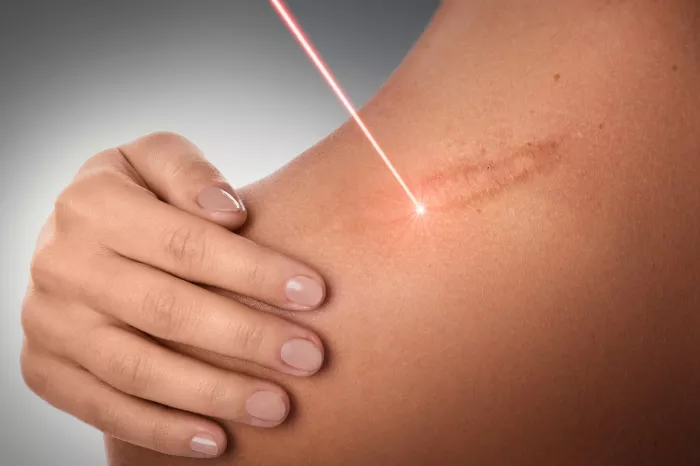Burn scars, resulting from injuries that affect the skin’s integrity, can pose both physical and emotional challenges. Amid the myriad of remedies, one compound that has captured attention is vitamin E. This article delves into the question: Is vitamin E good for burn scars? Exploring the science, benefits, and considerations surrounding vitamin E in burn scar management provides insight into its potential role in the healing process.
Understanding Burn Scars
Before exploring the potential benefits of vitamin E for burn scars, it’s essential to understand the intricacies of scar formation. Burn scars result from injuries that damage the skin’s layers, triggering a cascade of healing processes. The severity of the burn, depth of tissue affected, and individual healing factors contribute to the characteristics of the resulting scar. Burn scars can be hypertrophic, keloid, or atrophic, each presenting unique challenges in their management.
The Role of Vitamin E
Vitamin E, a fat-soluble antioxidant, has long been heralded for its potential in promoting skin health and wound healing. As a group of compounds, including tocopherols and tocotrienols, vitamin E exerts antioxidant effects by neutralizing free radicals. Free radicals, generated during the inflammatory phase of wound healing, can contribute to tissue damage. Vitamin E’s antioxidant properties position it as a candidate for mitigating oxidative stress and supporting the healing process.
Antioxidant Action
The antioxidant prowess of vitamin E holds promise in minimizing oxidative stress, a factor implicated in scar formation. Burn injuries often trigger an inflammatory response, leading to the production of free radicals. These free radicals can contribute to cellular damage and influence the development of hypertrophic or keloid scars. By neutralizing free radicals, vitamin E may play a role in reducing oxidative stress and potentially influencing the characteristics of burn scars.
Collagen Synthesis
Collagen, the primary structural protein in the skin, plays a pivotal role in scar formation. Imbalances in collagen synthesis can result in hypertrophic or atrophic scars. Vitamin E has been suggested to influence collagen synthesis, potentially promoting a more organized and less visible scar texture. By modulating collagen production, vitamin E may contribute to the overall appearance of burn scars, influencing their texture and minimizing irregularities.
Moisturizing Properties
Maintaining adequate skin hydration is crucial in scar management, and vitamin E is known for its moisturizing properties. The application of vitamin E oil or creams on burn scars may contribute to hydration, preventing excessive dryness and promoting a more supple scar texture. The moisturizing benefits of vitamin E can be particularly relevant in the early stages of scar healing when proper hydration is essential for optimal tissue repair.
Anti-Inflammatory Effects
Inflammation is a natural part of the healing process, but its excessive or prolonged presence can contribute to scar formation. Vitamin E has been studied for its potential anti-inflammatory effects. By modulating inflammatory pathways, vitamin E may help mitigate inflammation in the burn scar healing process. This anti-inflammatory action could contribute to minimizing redness, swelling, and discomfort associated with burn scars.
Protection Against Sun Damage
Sun exposure is a critical consideration in scar management, as UV radiation can exacerbate scar visibility. Vitamin E’s photoprotective properties make it a valuable component in scar care. The application of vitamin E to burn scars may offer an additional layer of defense against UV-induced damage, potentially reducing the risk of hyperpigmentation and supporting the overall health of the scarred tissue.
Scientific Studies
Scientific inquiry into the effectiveness of vitamin E for burn scars has yielded mixed results. While some studies suggest potential benefits, others raise questions about its efficacy. A systematic review published in the “International Journal of Surgery” in 2016 concluded that there is limited evidence to support the use of vitamin E in scar management. The variability in study designs, patient populations, and methodologies underscores the need for further research to establish clear guidelines on the role of vitamin E in burn scar treatment.
Considerations and Caution
Despite its potential benefits, the use of vitamin E for burn scars is not without considerations and cautionary notes. Some individuals may experience allergic reactions to vitamin E, leading to skin irritation. Conducting a patch test before widespread application is advisable to identify potential sensitivities. Additionally, applying vitamin E to open wounds or burns may not be recommended, as it could cause further irritation. Consulting with a healthcare professional before incorporating vitamin E into burn scar care is essential, especially for individuals with pre-existing skin conditions or allergies.
Forms of Vitamin E
Vitamin E is available in various forms, including oral supplements, topical creams, and oils. The choice of form for burn scar application depends on individual preferences, the specific characteristics of the scar, and the advice of healthcare professionals. Topical applications, such as vitamin E oil or creams, are commonly used for scar management, allowing for targeted and localized treatment. Oral supplements may be considered in consultation with healthcare providers, taking into account overall health and potential interactions with other medications.
Patient Experiences
Anecdotal evidence and patient experiences contribute to the narrative surrounding vitamin E and burn scars. Some individuals report positive outcomes, noting improvements in scar texture, color, and overall appearance with the consistent use of vitamin E. Others, however, may not observe significant changes. The subjective nature of these experiences highlights the variability in individual responses to vitamin E and emphasizes the need for personalized approaches to burn scar management.
Conclusion
The question of whether vitamin E is good for burn scars involves a nuanced consideration of scientific evidence, potential benefits, and individual factors. While vitamin E holds promise in minimizing oxidative stress, influencing collagen synthesis, and providing moisturizing and anti-inflammatory effects, its efficacy for burn scars is not universally established. Caution is advised, and individuals considering the use of vitamin E for burn scars should consult with healthcare professionals, conduct patch tests, and be mindful of potential allergic reactions.
In the multifaceted journey of burn scar management, the role of vitamin E emerges as one aspect among many. As research continues to unfold, and scientific understanding evolves, individuals are encouraged to approach the use of vitamin E with a discerning eye, recognizing that the optimal approach to burn scars may involve a combination of evidence-based interventions, professional guidance, and personalized care.
[inline_related_posts title=”You Might Be Interested In” title_align=”left” style=”list” number=”6″ align=”none” ids=”3361,3359,3257″ by=”categories” orderby=”rand” order=”DESC” hide_thumb=”no” thumb_right=”no” views=”no” date=”yes” grid_columns=”2″ post_type=”” tax=””]

































